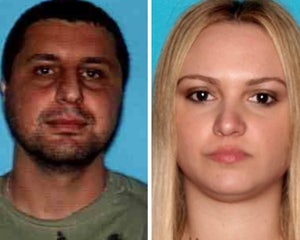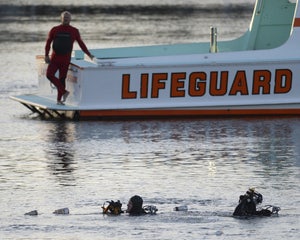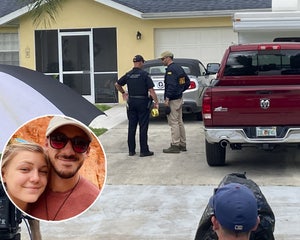The buyer was not the foreign power they thought — but an undercover FBI agent.
A U.S. Navy nuclear submarine engineer and his wife have been charged with attempting to sell military secrets to a foreign power.
Maryland couple Jonathan and Diana Toebbe were arrested by the FBI and the Naval Criminal Investigative Service on Saturday, accused of violating the Atomic Energy Act.
According to the Department of Justice, the pair sold classified information to an agent they believed was working for a foreign government, hiding the data on encrypted SD cards, which in turn were hidden inside peanut butter sandwiches, packets of chewing gum and Band-Aid wrappers.
The person they were selling to was actually an undercover FBI agent.
YouTuber 'Omi in a Hellcat' Charged With Operating $30Million Illegal Pirate TV Ring, Faces Life in Prison
Jonathan Toebbe, 42, is an employee of the Department of the Navy who served as a nuclear engineer and was assigned to the Naval Nuclear Propulsion Program. He held an active national security clearance through the U.S. Department of Defense, giving him access to Restricted Data.
According to the DOJ, Toebbe worked with and had access to information concerning naval nuclear propulsion including military sensitive design elements, operating parameters and performance characteristics of the reactors for nuclear powered warships.
The affidavit alleges that on April 1, Toebbe sent a package to a foreign government, listing a return address in Pittsburgh, Pennsylvania, containing a sample of Restricted Data and instructions for establishing a covert relationship to purchase more.
“I apologize for this poor translation into your language” a letter with the package read, per the criminal complaint. “Please forward this letter to your military intelligence agency. I believe this information will be of great value to your nation. This is not a hoax.”
He then began corresponding with the individual via ProtonMail encrypted email over several months, striking up an agreement to sell Restricted Data in exchange for thousands of dollars in cryptocurrency, it claims. Toebbe went by the pseudonym “ALICE,” while the FBI agent identified themselves as “BOB”.
On June 8, the undercover agent sent $10,000 in cryptocurrency to Toebbe as a “good faith” payment. On June 26, the Toebbes traveled to a location in West Virginia where, with Diana — a faculty member and humanities teacher in Annapolis — acting as a lookout, Jonathan placed an SD card concealed within half a peanut butter sandwich at a pre-arranged “dead drop” location.
FBI Hunting LA Couple Who Cut Off Ankle Tags and Fled After Defrauding $21M of PPP Loans
After retrieving the SD card, the undercover agent sent Jonathan Toebbe a $20,000 cryptocurrency payment. In return, Jonathan emailed the agent a decryption key for the SD card.
A review of the SD card revealed that it contained Restricted Data related to submarine nuclear reactors.
On July 31, he made another dead drop, this time inside a sealed Band-Aid wrapper with a Band Aid inside, left in a clear Zip Lock bag.
On Aug. 28, Jonathan made a third dead drop of an SD card in eastern Virginia, this time concealing it in a chewing gum package. He received $70k for this one, once again sending the agent a decryption key for the card after payment.
On October 9, while the couple allegedly attempted to make a fourth dead drop in west Virginia, the FBI were waiting, and arrested them on espionage-related charges.
During the correspondence, Toebbe had expressed fears about the identity of the contact, at one stage asking: “Is there some physical signal you can make that proves your identity to me? I could plan to visit Washington, D.C., over Memorial Day weekend. I would be just another tourist in the crowd. Perhaps you could fly a signal flag on your roof?”
The agent replied: “We will set a signal from our main building observable from the street.” Satisfied after receiving the signal, Toebbe continued the correspondence, the affidavit says.
According to the affidavit, it was Toebbe’s idea for the dead drops so they didn’t have to physically meet in person, as well as the use of the difficult-to-track Monero cryptocurrency, citing the risk of “blockchain analysis of BitCoin and other cryptocurrencies.”
“Monero gives us both excellent deniability,” he wrote.
Dad Sentenced to 212 Years For Driving Autistic Sons Off LA Pier to Collect Insurance Money
“Please remember I am risking my life for your benefit, and I have taken the first step,” he wrote during the initial negotiation, per the affidavit.
In his letter with the third dead drop, Toebbe asks for help should he ever “need to leave on short notice.”
“Should that ever become necessary, I will forever be grateful for your help extracting me and my family,” her wrote, per the affidavit. “I surmise the first step would be unannounced travel to a safe third country with plans to meet your colleagues. We have passports and cash set aside for this purpose.”
He concludes: “One day, when it is safe, perhaps two old friends will have a chance to stumble into each other at a cafe, share a bottle of wine and laugh over stories of their shared exploits. A fine thought, but I agree that our mutual need for security may make that impossible.”
“Whether we meet or no [sic], I will always remember your bravery in serving your country and your commitment to helping me.”
The FBI did not reveal which foreign power Toebbe thought he was dealing with, the documents only identifying it as “COUNTRY1”.
“The complaint charges a plot to transmit information relating to the design of our nuclear submarines to a foreign nation,” Attorney General Merrick B. Garland said. “The work of the FBI, Department of Justice prosecutors, the Naval Criminal Investigative Service and the Department of Energy was critical in thwarting the plot charged in the complaint and taking this first step in bringing the perpetrators to justice.”
Brian Laundrie's Parents Change Story About When He Went Missing
Source: Read Full Article



